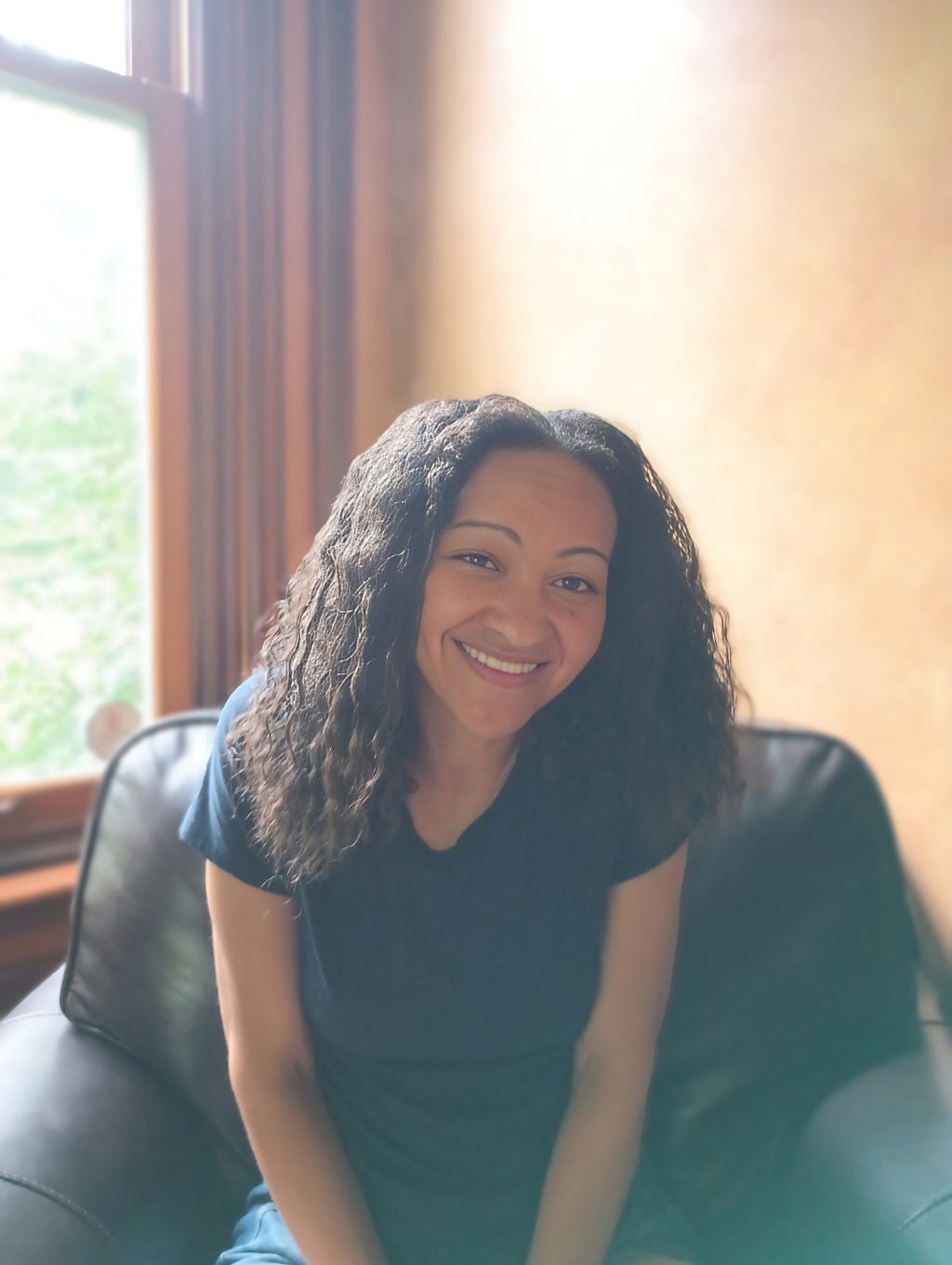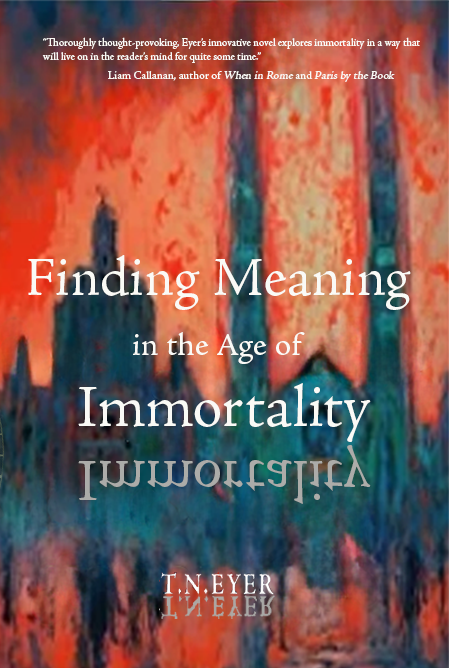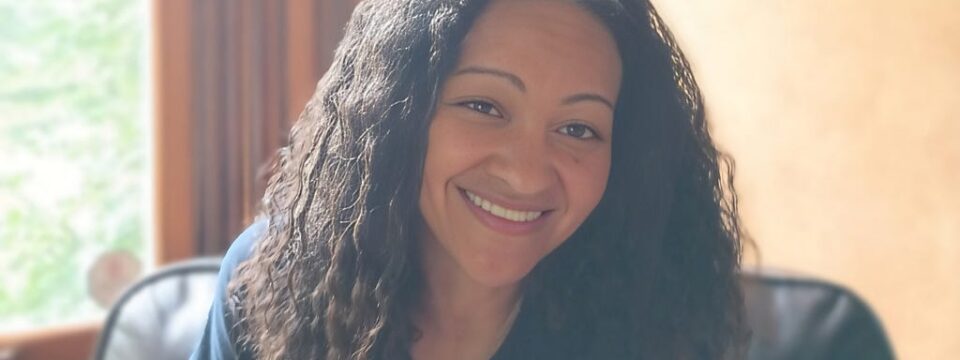
Savor every single success. Success can be difficult to define in this field, and it’s tempting to continually move the goalposts. Once upon a time I thought getting a novel published was all I needed to feel successful. Since then I’ve added additional goals: a certain number of sales, a certain amount of money made, awards, positive reviews, etc. This is a field in which there is so much rejection. Savor every good thing that happens.
As a part of our series called “Five Things I Wish Someone Told Me When I First Became An Author”, I had the distinct pleasure of interviewing T.N. Eyer.
T.N. Eyer graduated from Yale College and Yale Law School. She practiced corporate law in London and in Los Angeles before happily transitioning to writing fiction full time. Her first novel, Finding Meaning in the Age of Immortality, was published by Stillhouse Press in November. Her short fiction has appeared in a number of literary magazines, among them december, Hayden’s Ferry Review, and Water~Stone Review, and in two anthologies: Heresy Press’s Nothing Sacred and Coolest American Stories 2024. Her story “Date of Death” was listed as a Distinguished Story in Best American Short Stories 2022.
She is an avid reader, hiker, and traveler. She has gone caving in Vietnam, horseback riding in Mongolia, and sand sledding in Namibia, but when she’s home she gets most of her exercise playing Dance Dance Revolution in her garage. She lives in Pittsburgh with her husband and daughter.
Thank you so much for doing this with us! Our readers would love to get to know you a bit better. Can you tell us the story of how you grew up?
My parents divorced when I was small, and I was raised by my mother. She grew up in poverty but managed to get a full scholarship to college and become a high school English teacher. As a result, she very much believed in the power of education. She used to say she would never deny me a book, a policy I took advantage of every time we were anywhere near a bookstore. Given this, perhaps it’s no surprise that I became a writer!
Can you share a story with us about what brought you to this specific career path as a writer?
It was so serendipitous! I’m a corporate lawyer by training, but one day, when work was slow, I started writing a novel. I would occasionally let my husband read parts of it, and he thought it had potential. The next year my husband — he’s an academic — had a sabbatical. We were trying to figure out how to handle that. This was before Zoom, so I couldn’t just work remotely. I couldn’t go anywhere at all if I wanted to keep my job. But my husband didn’t want to sacrifice his sabbatical either. Eventually, he asked if I would be interested in taking a break from my job and trying my hand at writing for a year. I leapt at the chance! It was supposed to be temporary, but I never went back to law after that.
Can you tell us the most interesting story that happened to you since you began your career?
My first publication was a short story called “The Augmentation Dilemma.” It was accepted at the first place I submitted it. It even won a prize (an honorable mention in a short story contest). Anybody who has any experience submitting to literary magazines knows that this just never happens. Submitting is hard. Rejections are plentiful. But having such early success with this story gave me the push I needed to continue pursuing this career.
It has been said that our mistakes can be our greatest teachers. Can you share a story about a mistake you made when you were first starting? Can you tell us what lesson you learned from that?
After working in a more structured job, I was delighted by the freedom and flexibility I had as a writer. The result, though, was that I wasn’t as responsible as I needed to be. I traveled. When friends visited (or when I visited friends) I didn’t work at all but just spent time with them. I always rearranged my schedule to meet the needs of friends or family who had less flexible schedules. I have since learned that one of the most important things I can do as a full-time writer is to block off time on my calendar as “writing time.” When friends visit, I still reserve several hours every day to write. I value my time as much as I value the time of friends with more traditional jobs. In short, I learned that if I want writing to be a career, I have to treat it as a career and not as a hobby.
None of us are able to achieve success without some help along the way. Is there a particular person who you are grateful towards who helped get you to where you are? Can you share a story about that?
Absolutely my husband. He has given me two incredible gifts over the course of our marriage. One is my daughter, but the other is allowing me to follow my dreams, even though that meant giving up a six-figure salary. I would have been far too risk-averse to pursue a career in writing without his emotional and financial support.
You have been blessed with great success in a career path that can be challenging. Do you have any words of advice for others who may want to embark on this career path, but seem daunted by the prospect of failure?
Honestly, I don’t recommend this as a career unless you have savings or a supportive partner. Otherwise, it’s a hard and not very lucrative life. I hate to say that. I feel like I should be encouraging everyone to take a risk and pursue their dreams. But that’s not how I feel, and it’s not the advice I would give myself. Writing is wonderful, but it’s also difficult. Success is rare and random. Really, there’s so much luck involved. It takes nerves of steel, and most writers still have another job, a day job, that pays the bills.
You have such impressive work. What are some of the most interesting or exciting projects you are working on now? Where do you see yourself heading from here?
Right now, I’m working to finish up a short story collection. All the stories are speculative and attempt to ask thought-provoking questions about important matters (life, death, love, culture, etc.). That’s really the path I see myself pursuing — speculative novels and short stories that take place in a world that is similar to — but not exactly like — ours.
Where do your ideas come from and what is that creative process like?
Everywhere. The news. Conversations with friends. The idea for my novel came from a dream my husband had! For me, coming up with ideas is the easy part. Turning them into compelling stories is a lot harder.

Super. Here is our main question. What are your “Five Things I Wish Someone Told Me When I First Became A Published Author” and why?
- It’s a rollercoaster. When my book first became available on Amazon it skyrocketed to the Number 1 New Release in Contemporary Fiction & Literature. People were posting favorable reviews. I was asked to give talks and participate in readings. It felt like momentum was building. But two weeks later, it felt like all the buzz had completely died off. This happened again when I had my book launch at a local bookstore and it had happened before when I did a reading at a book festival in Washington D.C. This emotional rollercoaster can be difficult and frustrating, but it’s very much a part of the journey.
- You will be frustrated with your publisher. My publisher, Stillhouse Press, is mostly wonderful. They are kind and responsive and willing to do everything they can to promote my book within their limited budget. But they’re also human, and their instincts are not always my instincts. So be patient with your publisher. Be kind. Remember that you’re all on the same side and talk to them about concerns that arise. When I first saw my book cover I hated it so much I wanted to cry. When I expressed this to my publisher (kindly!) they were incredibly receptive and started again from scratch. I actually really like my cover now!
- Not everyone will love your book. There will be negative reviews and hurtful remarks and friends who don’t finish it. And that hurts SO MUCH because you’ve poured so much of yourself into this project and been through so much to get to this point. But it’s the nature of the game. A writer friend of mine told me that every time she gets a negative review, she pulls up the Goodreads page of one of her favorite books and reads some of the negative reviews it received, just to remind herself that you’ll never be able to please everybody. I think this is a very good idea.
- Savor every single success. Success can be difficult to define in this field, and it’s tempting to continually move the goalposts. Once upon a time I thought getting a novel published was all I needed to feel successful. Since then I’ve added additional goals: a certain number of sales, a certain amount of money made, awards, positive reviews, etc. This is a field in which there is so much rejection. Savor every good thing that happens.
- Friends and family will surprise you. My friends and family have been remarkable in their support. Some of my busiest friends were the first to read the novel and write reviews. People I’m not especially close to have promoted the book on social media. At my book launch, the number of parents and teachers from my daughter’s daycare who showed up really warmed my heart. Seeing what a wonderful community I’ve built has been, quite unexpectedly, the most gratifying part of this entire process.
Can you please give us your favorite “Life Lesson Quote”? Can you share how that was relevant to you in your life?
It’s a Churchill quote… “If you’re going through hell, keep going.” This is what gets me through the difficult times, this reminder that all I can do is keep going because the alternative — lingering in hell, finding myself stuck there forever — is untenable, and because avoiding difficult times altogether is impossible. This is what gets me through lengthy spans of time when all I get is a string of rejections in my writing career. This is what got me through months of sleepless night with my daughter. This is what has helped me since my mother died. Life is hard, but I want to be the kind of strong, resilient person who gets through the hard times. This quote helps me with that.
You are a person of influence. If you could inspire a movement that would bring the most amount of good to the most amount of people, what would that be?
My goal as a writer is never to tell people how to think but rather to get them thinking critically about contemporary issues and issues that may arise in the near future. I want people to have difficult discussions with people who disagree with them and consider perspectives they’d never considered before. I don’t know if I’d call this a movement, but really what I want is for people to be think for themselves, to be open-minded and considerate, and to be willing to change their minds.
Is there a person in the world whom you would love to have lunch with, and why? Maybe we can tag them and see what happens!
Margaret Atwood. You can’t be in this (speculative fiction) space and not want to have lunch with the master.
Are you on social media? How can our readers follow you online?
I’m newly on Instagram! TNEyerwriter
This was so informative, thank you so much! We wish you continued success!
T.N. Eyer: 5 Things I Wish Someone Told Me When I First Became An Artist was originally published in Authority Magazine on Medium, where people are continuing the conversation by highlighting and responding to this story.
